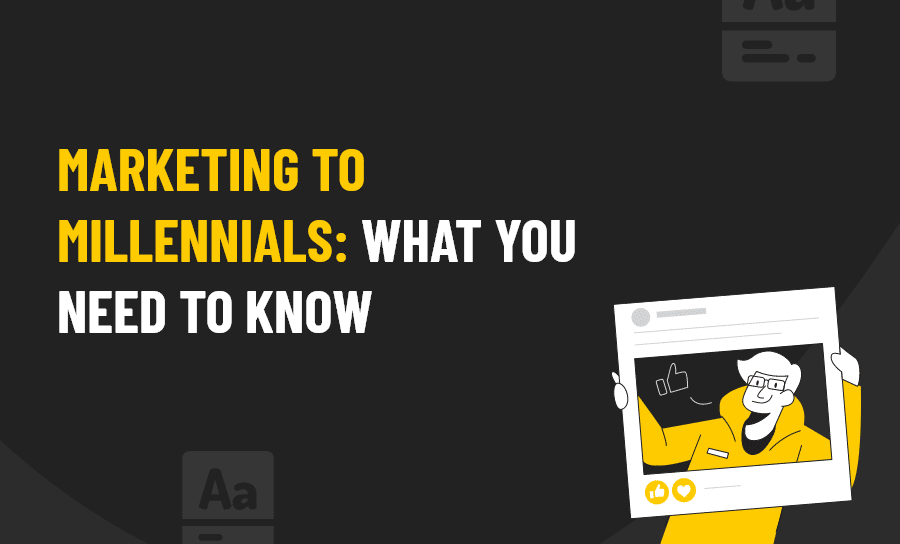You’ve seen them, even if you aren’t one. They’re walking around shopping malls, grocery stores, and cafés all the time, eyes glued to their smartphones and coffees from Starbucks in hand. They make up half of Instagram. They are very active on LinkedIn. It’s Millennials. Millennials, according to Pew Research Center, make up one-quarter of the nation’s population in the UK and the figures are similar in the US.
The term “Millennial” refers to anyone born between 1981 and 1996. As the largest living generation on both sides of the pond, it is important to develop a B2B marketing and B2B lead generation strategy specifically targeting this age group. That’s because the millennial generation is making more and more B2B purchasing decisions directly, and they also greatly influence the customers they serve.
The challenge is that Millennials tend to think and buy differently than others. For younger generations, what works well in the lead generation and marketing space for the Baby Boomer and Gen X generations won’t be nearly as successful.
Effective marketing to millennials requires knowing and understanding their beliefs and what factors lead to their buying decisions. If millennials are a target audience for your business, you can adjust your marketing and lead generation efforts to better reach this demographic market.
1. MILLENNIALS VALUE “AUTHENTICITY.”
Developing millennial relationships is more than providing the lowest price or better customer service. It’s authenticity. Millennials want to feel like brands and service providers are committed to building a relationship, not just trying to sell. They can see beyond typical ads and sales pitches. 84 % of millennials don’t trust conventional advertising and are the demographic least likely to click on PPC ads, however smartly worded, as they have an inherent distrust of them.
How much do these millennial decision-makers distrust other companies and their ethics? According to “The 2018 Deloitte Millennial Survey.”
- Only 48 percent of respondents in a survey of 10,500 people believe corporations behave ethically, a decline from 65 percent> in 2017
- Just 47 percent think established businesses are committed to helping society improve, down from 62 percent a year earlier. Of these respondents, 98% believed that companies under their generation’s leadership were more committed to responsibility.
Millennials want to hear the company’s true story. They want to see what happens behind the scene. Show them you care about more than just getting their money. Thirty-seven percent of millennials say they’re willing to buy a product or service from a company that supports a cause they believe in, even if they pay more. If your product is more costly than rivals, if you help a noble cause, you still have a chance to win over millennial decision-makers.
Sponsor charitable events or sustainably source your products? Has your business established an annual volunteer day or makes charitable contributions? You’ll need to find ways to get this across to these millennial decision-makers if you want to sell to/work with them.
This is especially important right now, in a politically charged global climate that is seeing businesses suffer in the eyes of millennials if they do not take some kind of stand on hot button issues.
2. GET IN TOUCH WITH THEM WHERE THEY HANG OUT
Millennials are very active on platforms like LinkedIn and Instagram. To meet this audience, you need to interact on their turf. This includes engaging with people directly via these channels and maintaining a strong, heavily branded but still authentic social media presence.
Older generations don’t faff about with social media, but millennial consumers do. They dominate every social media platform, so if your marketing strategy doesn’t include social media marketing, you’re missing out on a huge potential audience.
Don’t just try to sell the goods. Be sure to add informative, industry-related posts and insights to your social pages. This will help build your expertise and drive traffic to your website. Traditional marketing is great, but take your campaigns to the digital marketing platforms, post on Twitter, Facebook, etc. and the younger generation will listen to you. And posting news from other sites will prove you have a finger on your industry’s pulse.
Social networking can also be a fantastic customer engagement tool. It builds brand loyalty. When people post feedback or ask questions on your social media accounts, your company needs to respond quickly. Millennials expect transparency and prompt responses. If someone leaves a negative comment, don’t ignore it. Respond as soon as possible and pursue the offline chat.
Some other ideas for reaching this generation through social media:
- Creating testimonials
- Share a blog post in which your brand is tagged (after authorizing the original poster)
- Ask loyal customers to check Facebook
- Using polling to boost public participation
- Look at your company behind the scenes
- Highlight employees
- Make use of LinkedIn as a 21st century cold email tool (of sorts) LinkedIn lead generation, a sub-genre in itself of lead generation is particularly effective in reaching millennials.
3. MOBILE-FRIENDLY IS NOT OPTIONAL
Mobile website design is another critical aspect of millennial marketing and lead generation. Ninety-three percent of millennials own smartphones, versus 68 percent of Baby Boomers. And they constantly use their mobile device to research and purchase products and services. If your website isn’t mobile-friendly, visitors instantly bounce from your site.
Ensure your mobile app landing pages, emails, and website are configured to not just be mobile-friendly but mobile-first. The interface will suit any size computer, be it a smartphone, tablet, or desktop. Any element of your website should be considered mobile. Buttons and ties should be bigger and have enough space around them so visitors can quickly click them without unintentionally hitting neighboring buttons.
4. VIDEO CONTENT IS EFFECTIVE, AND PODCASTING IS GREAT
Since millennials are infamous for using – or is that even over-using their technology – it should come as no surprise they love watching video content. They watch online videos averaging 5 hours and 39 minutes per week. This gives your brand the perfect opportunity to connect with millennials. By consistently publishing video content that gives value to these consumers, you can build relationships with these buyers and even make them lifelong brand advocates.
For many B2B marketers, keeping up with creating and publishing a steady stream of video content can be challenging. Here are some ideas to help you develop content that speaks to millennials:
- Service and/or product demos
- How to videos could help millennials relate to your products/services
- Repurposed and retooled blog material
- Customer testimonies
- Interviews with experts
If a steady stream of video content seems like a lot of work, that’s because it is. Video production can take time and resources that some businesses don’t have a lot of. This is why podcasting is an alternative worth looking into, both appearing as a guest and maintaining your own podcasts.
Millennial interest in business podcasts has revitalized what was once a stalled genre. And they can be a great way to reach prospects outside the office. Take a look at the chart below. As you can see, research has found that Millennials will listen to podcasts at all kinds of times of the day and while doing all kinds of things. In a nutshell, they are powerful lead generation tactics that work 24/7, and who wouldn’t love to take advantage of that?

WORK WITH MILLENNIALS
If you are considering outsourcing any part of your lead generation efforts who you work with is, of course, of huge importance. And to reach millennial decision-makers, who better to do so than other millennials?
Take the Pearl Lemon Leads team. We’re all millennials, at various stages of the age group. So we are, we can confidently say, just the right team to understand the millennial mindset and to interact successfully with them. That being said, we’re experienced enough that we can relate to, engage and sell to B2B prospects from 19 to 90.
Why Marketing For Millennials?
Millennials increasingly control the way corporations and businesses work. If millennials are part of your target audience for lead generation, and it’s almost certain that they are, it’s time to reconfigure your lead generation plan to engage this group better. Pearl Lemon Leads can help. Contact us today.






